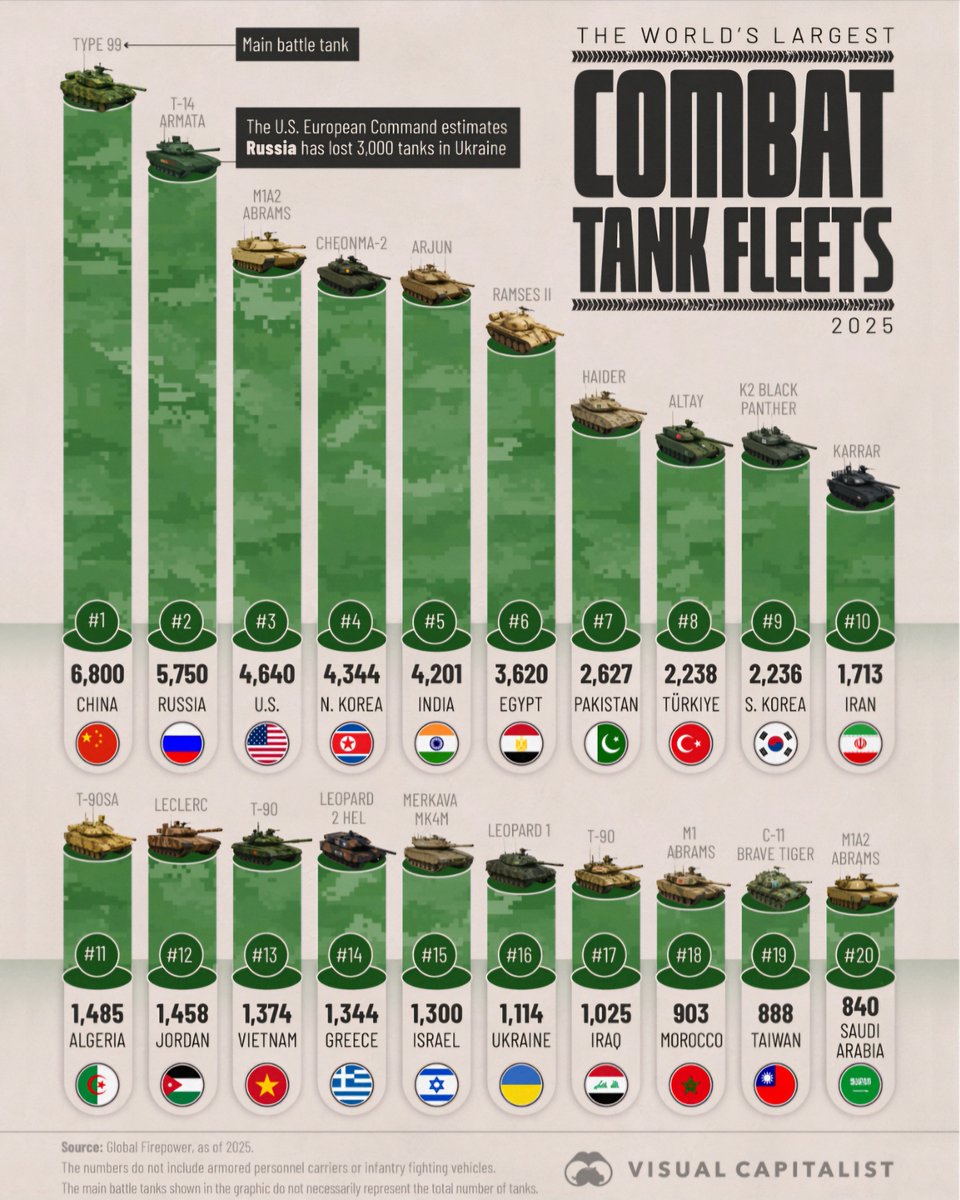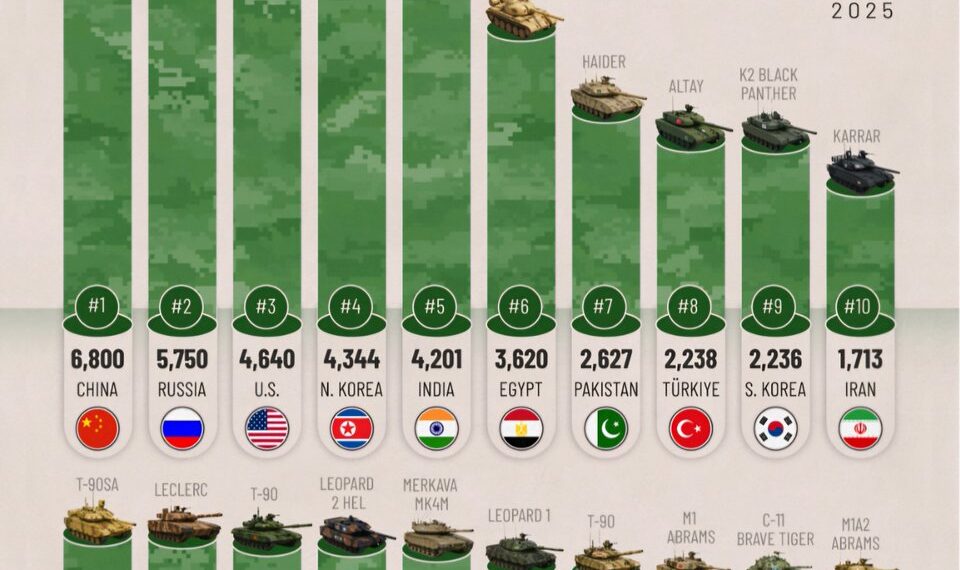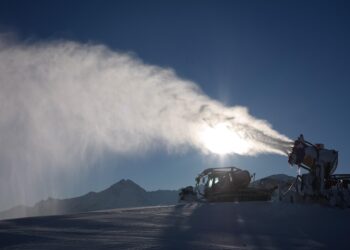Select Language:

Top 20 Countries with the Largest Combat Tank Fleets in 2025
1. China Leads the Global Tank Count with 6,800 Units
China continues to be the world’s top tank powerhouse, boasting an impressive fleet of approximately 6,800 combat tanks. This extensive arsenal reflects China’s strategic emphasis on modernizing its military capabilities, safeguarding its border areas, and projecting power regionally and beyond. The Chinese tank fleet includes a variety of armored vehicles, with advanced models like the Type 99 and Type 96 making up the core of their forces. These tanks are believed to be equipped with cutting-edge technology in armor, firepower, and mobility, supporting China’s broader military modernization efforts.
2. Russia Maintains a Robust Fleet of 5,750 Tanks
Russia’s combat vehicle numbers remain significant, totaling around 5,750 tanks. Despite facing economic sanctions and ongoing conflicts, Russia has preserved its armored strength. Russian tanks, primarily the T-90 and T-14 Armata, continue to serve as the backbone of its ground forces. These vehicles are upgraded with newer armor, weaponry, and surveillance systems, underlining Russia’s focus on maintaining tactical superiority on its borders and in strategic regions.
3. The United States Holds 4,640 Tanks in Its Arsenal
The US’s combat tank fleet comprises approximately 4,640 units, making it a formidable force worldwide. Primarily consisting of the M1 Abrams series, American tanks are renowned for their state-of-the-art armor, firepower, and advanced targeting systems. The US military continues to invest heavily in the modernization of its tank fleet, integrating upgraded armor, enhanced sensors, and interoperability with other advanced combat systems to ensure dominance on the battlefield.
4. North Korea’s Significant Tank Reserve of 4,344 Units
North Korea maintains a large and somewhat antiquated but still sizeable tank fleet, estimated at around 4,344 units. These are mostly older models like the T-55 and T-62, with some modernized variants. The North Korean military prioritizes armored strength as a core element of its defense doctrine, focusing on asymmetric warfare potential and deterrence. Their incomplete modernization efforts aim to upgrade their tanks’ capabilities in the face of regional threats.
5. India’s Growing Tank Force of 4,201 Units
India’s tank fleet numbers approximately 4,201, reflecting its ongoing efforts to modernize and expand its armored forces. Major weapons include the T-90 Bhishma and the indigenous Arjun tanks. India’s broader military strategy emphasizes protecting its borders with China and Pakistan, with investments in advanced tank technology and strategic alliances intended to bolster its armored capabilities.
6. Egypt’s Large and Experienced Tank Fleet of 3,620 Units
Egypt reports a fleet of roughly 3,620 tanks, making it one of Africa’s most substantial armored forces. The Egyptian army predominantly fields M1 Abrams and older Soviet-era tanks, which have been modernized over the years. Egypt’s strategic location and its focus on regional stability drive its continuous efforts to upgrade and maintain its armored strength.
7. Pakistan’s Strategic Armor with 2,627 Tanks
Pakistan’s combat tank count reaches about 2,627, primarily consisting of Chinese-made tanks like the Type 85 and Type 88, along with some American M-60s. Pakistan invests heavily in armored units for its defense against neighboring India, with ongoing modernization programs aimed at extending tank service life and enhancing battlefield survivability.
8. Turkey’s Expanding Tank Arsenal of 2,238 Units
Turkey’s military boasts approximately 2,238 tanks, including domestically produced tanks such as the Altay, alongside older Western-made models. The Turkish armed forces focus on modernizing their armored fleet with advanced protection systems, improved mobility, and modern weaponry, reflecting their strategic goal of regional dominance and defense readiness.
9. South Korea’s Defenders with 2,236 Tanks
South Korea maintains a highly capable fleet of around 2,236 tanks, mostly composed of domestically developed K1 and K2 models. The country’s heavily fortified border with North Korea ensures that armored units remain vital for national defense, with continuous upgrades improving their technological edge in intelligence, surveillance, and firepower.
10. Iran’s Standalone Tank Strength of 1,713 Units
Iran operates an estimated 1,713 tanks, many of which are older models like the T-55 and T-72. However, Iran has been actively attempting to upgrade its armored capabilities by reverse-engineering and locally manufacturing newer systems. These efforts aim to boost its defensive capabilities amid regional tensions and conflicts.
11. Algeria’s Tank Numbers Reach 1,485
Algeria’s armored forces include roughly 1,485 tanks, encompassing a mixture of Russian-made T-90 and older Soviet-designed models. The country continues to focus on modernizing its fleet to better withstand regional threats, particularly from neighboring countries.
12. Jordan’s Strategic Armor Pool of 1,458 Tanks
Jordan’s military maintains approximately 1,458 tanks, mainly T-72s and a handful of older T-55s. Despite limited resources, Jordan invests in upgrading its existing fleet to ensure it remains capable of counteracting regional tensions, especially with neighboring Israel and Syria.
13. Vietnam’s Expanding Tank Fleet of 1,374 Units
Vietnam operates around 1,374 tanks, primarily older Soviet and Chinese models such as the T-54, T-55, and local variants. Vietnam is incrementally upgrading its force with newer BMP and tank systems to enhance its defense posture in Southeast Asia.
14. Greece’s Armored Strength of 1,344 Tanks
Greece’s armored forces comprise approximately 1,344 tanks, largely made up of American M60s and Leopard 2A4s. Upgrades are ongoing to improve their armor and firepower, strengthening Greece’s ability to defend its territory amid regional geopolitical challenges.
15. Israel’s Advanced Tank Fleet of 1,300 Units
Israel has approximately 1,300 tanks, notably including the modernized Merkava IV and future prototypes under development. Israel’s focus remains on maintaining technological supremacy, with ongoing upgrades to armor, weaponry, and strategic capabilities to counter regional threats.
16. Ukraine’s Resilient Tank Stock of 1,114 Units
Ukraine’s currently active battles have pushed its tank fleet to around 1,114 units. The country continues to modernize its armored fleet, including Russian T-64 and T-80 tanks, alongside new acquisitions from Western allies, emphasizing technological upgrades and maintenance to bolster defense.
17. Iraq’s Measure of 1,025 Tanks
Iraq’s military has roughly 1,025 tanks, predominantly older Soviet-era vehicles, though efforts are underway to modernize and procure newer systems to strengthen its national defense and counter regional instability.
18. Morocco’s Defensive Capabilities with 903 Tanks
Morocco fields about 903 tanks, including American M1 Abrams and older Soviet models. Morocco’s armored units are central to regional defense planning, with modernization initiatives aimed at enhancing their operational effectiveness.
19. Taiwan’s Strategic Force of 888 Tanks
Taiwan maintains an estimated 888 tanks, mainly upgraded American-made M60 and newer models. The island’s armored forces are a critical component of its defense strategy amid ongoing tensions with China, with continuous upgrades under progress.
20. Saudi Arabia’s Armored Guard of 840 Tanks
Saudi Arabia’s tank fleet totals around 840, primarily American-made M1 Abrams. The country invests heavily in its armored capabilities, acquiring latest-generation tanks and upgrading existing vehicles to safeguard its regional interests.
Additional Insights:
- The U.S. European Command estimates that Russia has suffered the loss of approximately 3,000 tanks in Ukraine since the conflict began.
- These figures represent main battle tanks only and do not account for armored personnel carriers or infantry fighting vehicles.
- The total number of tanks can vary as countries modernize, retire older models, or expand their fleets.
Source: Global Firepower, as of 2025







